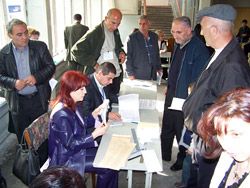The IT field deems to be one of the most important and developing sectors of the Armenian economy. There is no need to also note that the parliamentary elections were falsified with “Information Technologies” so well that everyone was surprised. Everything was organized so well that there was even no need to beat anyone or to steal any ballot boxes. Certainly, there were some local “fights”, but the reason was not the violations, but whom those violations would help.
However, this is not the only fact that makes the recent elections differ from past ones. It is surprising that the leaders of the parties that lost don’t blame the governmental parties for their failures, but the people. By the way, we don’t mean only Tigran Karapetyan’s critics (even though he does not have the right to complain, but we understand him), but also Artashes Geghamyan, who announced that in fact people rejected his “anti-crisis program” and cited that “each nation deserves its government”.
The problem is that by saying “people” we shouldn’t understand those poor citizens that took 5,000 dram from parties to vote for their candidates. Now let’s make a simple calculation. There were about 1,920 polling stations in Armenia, and 9 commission members in each polling station. This means that the overall number of these people is about 17 thousand. How many of these 17 thousand people have complained of electoral violations (we mean complaining, but not trying to prevent the violations)? A maximum of one thousand. In other words, over 16 thousand people haven’t said anything. Besides that, there were at least two other persons in each polling station who watched the electoral process (policemen, “district boys”, etc.). It is turning out that over 50 thousand people had their part in electoral violations. Now let’s try to find out who the commission members were. Certainly, they were not representing any benevolent organizations. The commissions were made mostly of teachers and other representatives of the mid-administrative level. The violations were done with their agreement. They are representing the people too. Who said that the people should always be the poor group of society?
By the way, when we are speaking about such violations, it means that we have facts. For instance, the leader of “Heritage” party, Raffi Hovhannisyan announced that his party had in fact received 250 thousand votes, instead of the registered 80 thousand votes. Thus he means that over 170 thousand votes of only their party have been taken away (falsified). As for this rate, it is 12% of the total number of votes. This means that the violations have affected the outcome of the elections. In addition, the leaders of some other parties are also saying the same.
By the way, these elections differ from the previous ones, not due to the fact that the main conflict is not between the authorities and the international community, but due to the fact that it is between the international community and the opposition. The opposition claims that the elections have been falsified, but the international community reports that there have been small violations, but there isn’t anything serious. The reason is not that we have been able to deceive the international community (even though many people say that the violations were so virtuous and even David Copperfield could not imagine such things). The reason is the fact that, firstly, the international community appreciates the fact that there were no victims during the elections, and, secondly, they like the fact that the parliament consists of pro-Russian governmental parties and pro-Western opposition parties (but not pro-Russian governmental parties and opposition parties that were pro-Russian also). Definitely the West thinks that during the presidential elections Raffi Hovhannsiyan, who is advocated by the West, will be able to counterbalance Serge Sargsyan, who is implementing a pro-Russian policy, and thus make a color revolution in Armenia too. This opportunity did not exist during the elections of 2003, as pro-Russian candidate Stepan Demirchyan could not lead a color revolution against another pro-Russian candidate.
In a word, this is an achievement on the part of the international community. They were not able to free Armenia from the pro-Russian authorities, but they could free Armenia from the pro-Russian opposition.
Notwithstanding, it is now clear that during the presidential elections of 2008 Raffi Hovhannisyan (or Arthur Baghdasaryan) will struggle against Stepan Demirchyan and Artashes Geghamyan more than against Serge Sargsyan. In other words, the leaders that failed to appear in the parliament still have much to do.

